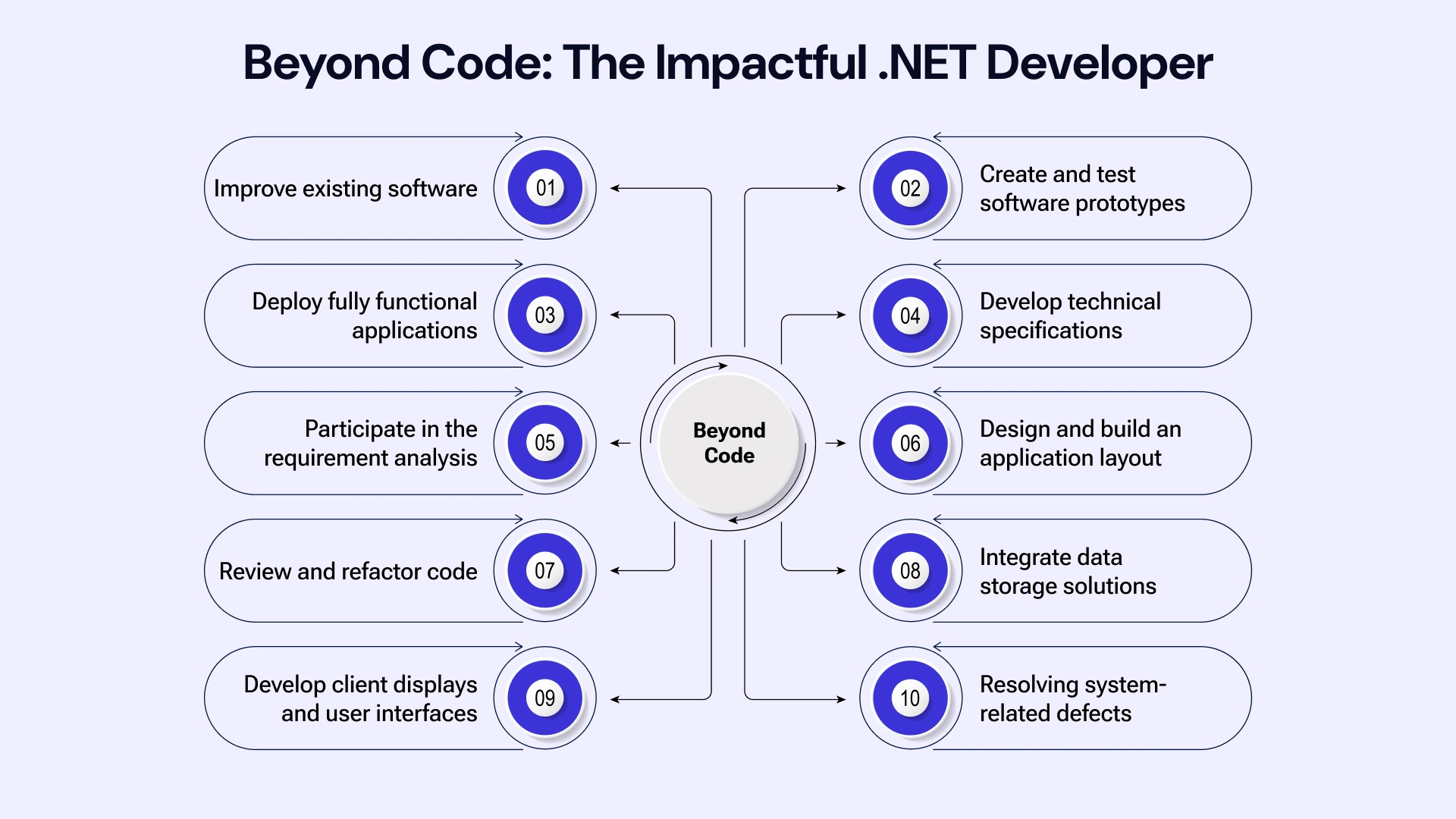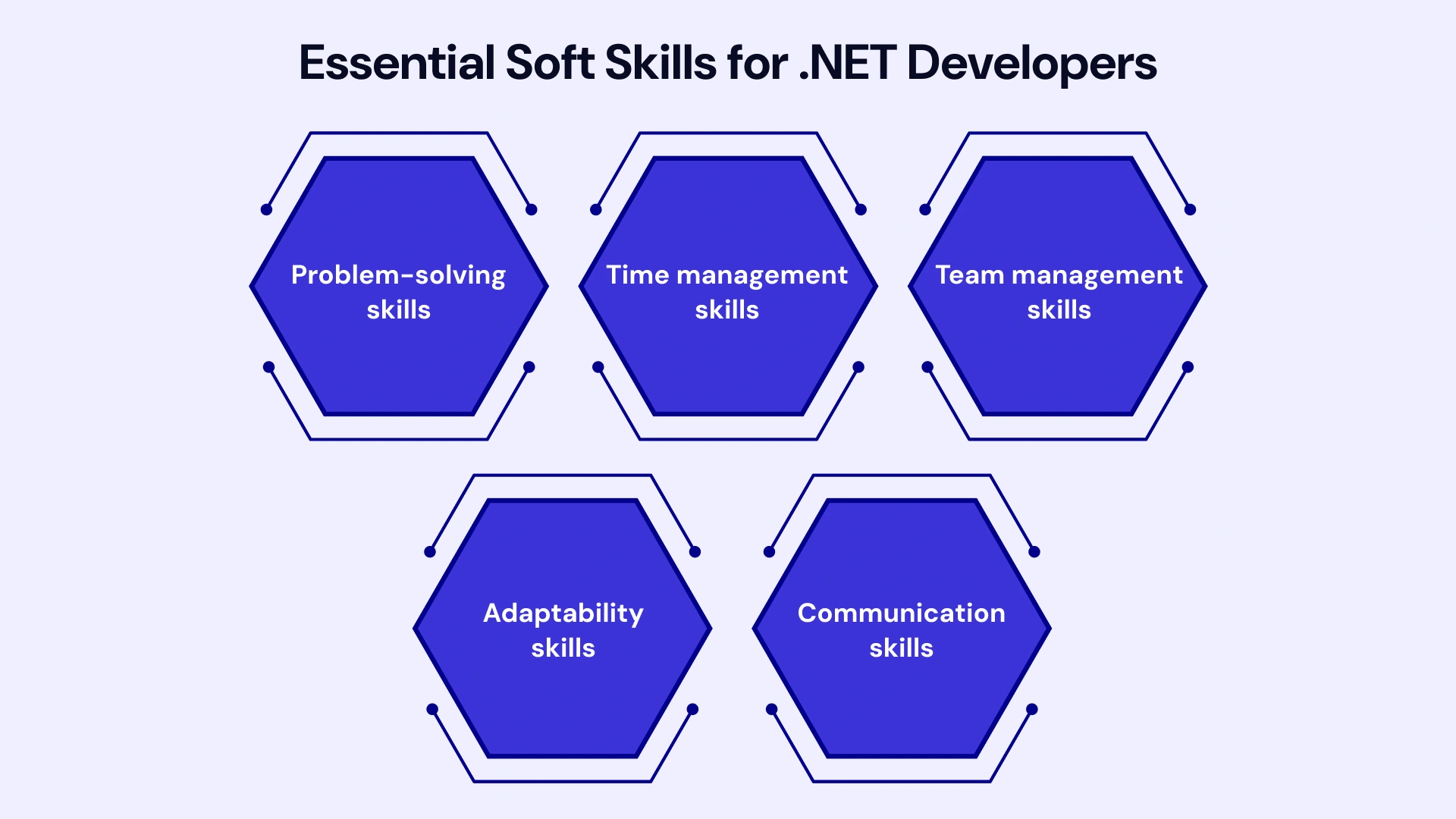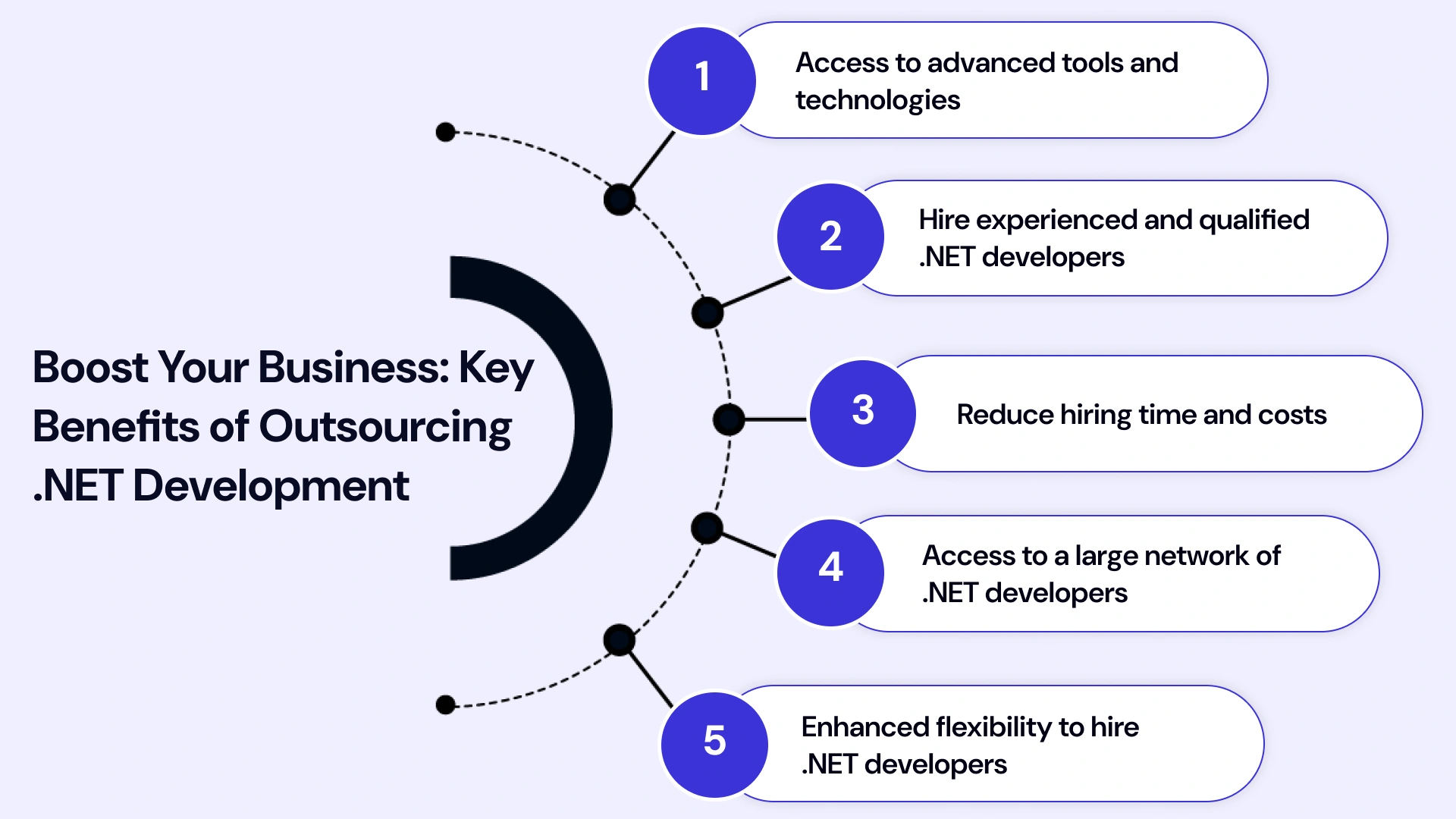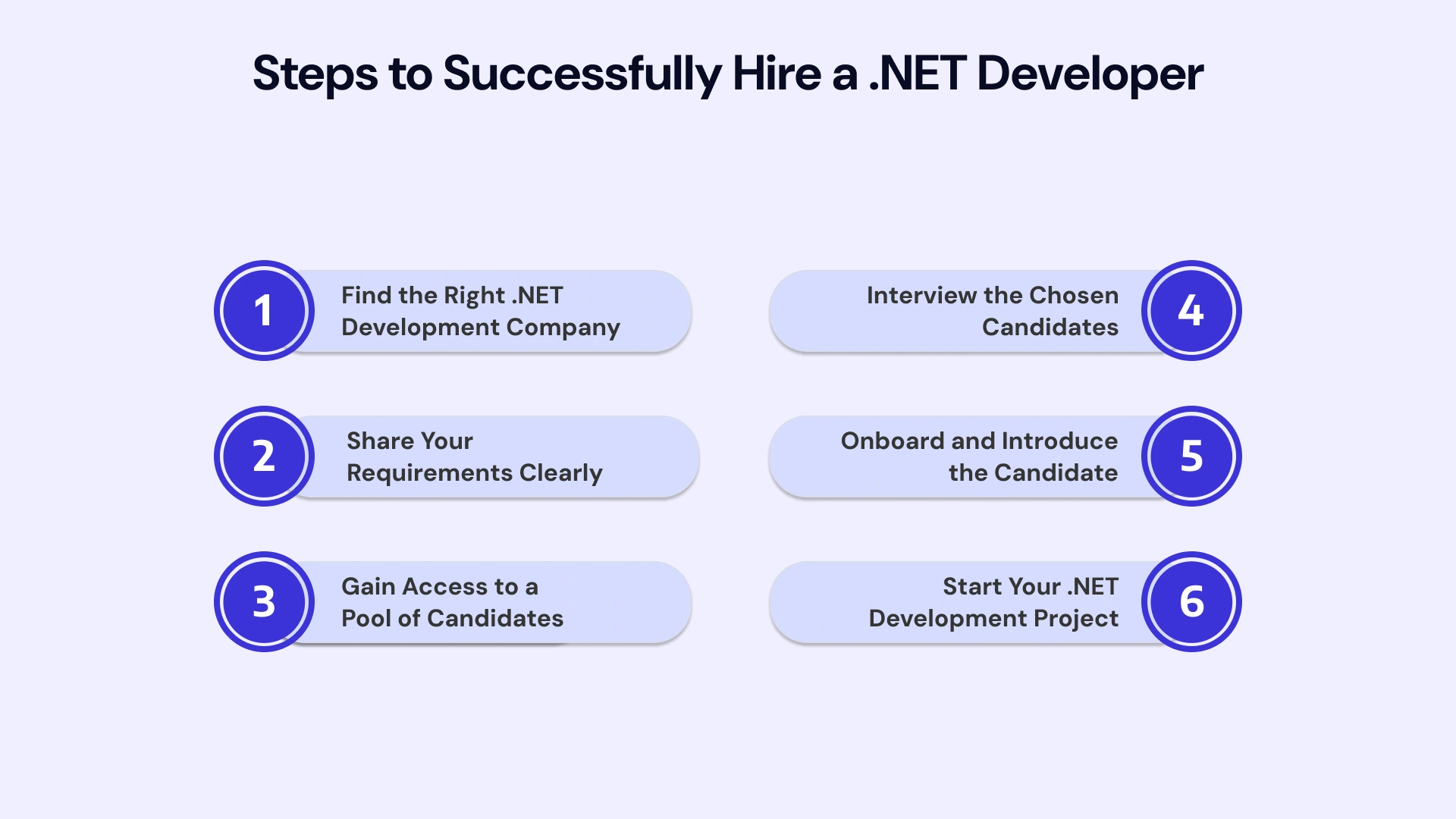In today's fast-paced digital landscape, businesses are constantly seeking innovative and robust ways to build exceptional web infrastructure and seamlessly integrate applications. This is precisely where a .NET solution becomes indispensable. It not only aligns with your core business strategies but also helps you achieve a measurable return on investment through custom .NET solutions tailored to your specific needs.
Want to delve deeper into why you should hire .NET programmers? Keep reading this comprehensive guide to understand the meaning, benefits, roles, responsibilities, and much more about .NET developers in detail!
What is a .NET Developer?
A .NET developer is a specialized software professional who uses Microsoft’s .NET framework to create versatile and high-performance applications across platforms, including Windows, web, mobile, and cloud environments. The .NET framework is a comprehensive development platform that provides extensive libraries, runtime, and tools facilitating rapid, secure, and scalable application building.
.NET developers typically employ languages like C#, VB.NET, and F#, leveraging frameworks such as ASP.NET Core, Blazor, and Entity Framework to design and deliver solutions that meet diverse business needs. Their work spans from creating user-friendly interfaces to developing robust back-end services and APIs.
Given the complexity and broad scope of .NET technologies, many businesses find it efficient to outsource these highly skilled professionals via specialized .NET development companies, ensuring access to expert talent without long-term commitments.
Let's explore the detailed responsibilities of a .NET expert in the next section.
Roles and Responsibilities of .NET Developer
A .NET developer's daily tasks are varied, contributing across a spectrum of project types — from desktop and web applications to advanced enterprise systems and microservices. Key responsibilities include:

- Developing and managing applications using the .NET framework and associated tools like ASP.NET Core and Blazor.
- Translating business requirements into scalable, user-centric software solutions.
- Maintaining and optimizing existing codebases to enhance performance and reliability.
- Collaborating with cross-functional teams, integrating the broader Microsoft technology stack including Azure cloud services.
- Refactoring and rewriting code for improved efficiency, adhering to clean coding principles and SOLID design patterns to reduce technical debt.
- Implementing robust security features, including authentication and authorization, using built-in frameworks like ASP.NET Identity, JWT tokens, and OAuth protocols.
- Conducting rigorous unit testing, debugging, and deploying incremental upgrades to maintain software quality.
- Architecting scalable solutions with a focus on modular design and microservices for enhanced maintainability.
- Proactively identifying system bottlenecks and troubleshooting issues to ensure continuous application availability.
Pro Tips: Security and Quality Assurance are critical parts of this role—.NET offers advanced built-in features such as Code Access Security (CAS), role-based security, and comprehensive cryptography libraries to build enterprise-grade secure applications. Utilizing these tools helps developers safeguard applications against common vulnerabilities like SQL injection, cross-site scripting (XSS), and unauthorized access.
Business Applications of .NET Developers
A .NET expert is capable of creating a wide range of applications on the .NET framework. While some are designed for a particular operating system or specific .NET implementation, others are cross-platform, offering immense versatility.
Here are some key business applications for which businesses can get expert .NET talent:
- Mobile Applications: Using .NET MAUI (Multi-platform App UI), developers create native apps for Windows, iOS, and Android from a single codebase, accelerating time to market.
- Desktop Applications: Build visually compelling and performant apps for Windows and macOS, using technologies like WPF and WinForms.
- Microservices: Design self-contained, scalable microservices running in Docker containers, facilitating enterprise workflows and cloud-native architectures.
- Cloud Solutions: Develop and deploy applications using cloud platforms such as Microsoft Azure and AWS, employing services for compute, storage, and AI integrations.
- Artificial Intelligence: Incorporate AI capabilities such as speech recognition, image processing, and predictive modeling by integrating C# and.NET with AI libraries and services.
- Game Development: Create interactive 2D and 3D games compatible with consoles, PCs, and mobile devices.
- Internet of Things (IoT): Build lightweight, efficient applications for IoT devices like Raspberry Pi, utilizing .NET’s cross-platform tools to connect and manage smart devices.
Additionally, .NET developers excel at building RESTful APIs, designing efficient database schemas with Entity Framework, and optimizing app performance for enterprise-scale deployment—a crucial advantage for digital transformation initiatives.
Technical Skills Required to Become a .Net Developer
The technical skills, also known as hard skills, of a .NET programmer vary significantly based on their employment level. Simply put, the technical skills of a junior .NET programmer will differ from those of a senior or team lead. Businesses must provide a clear and precise job description when they hire remote .NET developers to ensure they find the right fit.
Here’s a breakdown of the essential hard skills categorized by different experience levels:
Junior-Level .NET Developer
A junior .NET developer is expected to have a foundational understanding of the .NET ecosystem:
- Knowledge of programming languages such as F#, C#, or Visual Basic.
- Comprehension of the core concepts behind object-oriented programming (OOP).
- Familiarity with fundamental .NET frameworks and libraries.
- Basic knowledge of SQL and relational databases.
- Familiarity with version control platforms such as Git.
- A basic understanding of agile methodologies and the Software Development Lifecycle (SDLC).
- Knowledge of web development concepts and technologies, including HTML/CSS and ASP.NET.
Middle-Level .NET Developer
A middle-level .NET developer builds upon the junior foundation with more practical experience:
- Solid understanding of the .NET framework and C#.
- Proficiency in developing desktop applications using Windows Forms/WPF or web applications using ASP.NET Core 6.0 or ASP.NET MVC.
- Familiarity with database technologies such as MySQL or SQL Server.
- Proficiency with web technologies, including JavaScript, HTML, and CSS.
- Knowledge of best practices and design patterns in software development.
- Knowledge of unit testing frameworks such as MSTest or NUnit.
- The capacity to work effectively with web services and APIs.
- Familiarity with troubleshooting and debugging complex applications.
Senior-Level .NET Developer
A senior .NET developer possesses extensive experience and a deeper understanding of the .NET platform:
- Comprehensive understanding of C# and the .NET framework, including proficiency with performance-enhancing features and advanced programming languages.
- Proficiency with either ASP.NET Core or ASP.NET MVC to create highly scalable online applications.
- Working knowledge of advanced database principles, such as Entity Framework and query optimization for scalable architecture.
- Familiarity with cutting-edge web technologies, including CSS preprocessors and JavaScript frameworks and libraries (such as Angular, React, or Vue.js).
- Advanced familiarity with design patterns and software architecture is crucial for custom .NET solutions.
- Familiarity with cloud computing platforms and services such as AWS or Azure.
- Familiarity with advanced software testing approaches, such as pipelines for Continuous Integration and Continuous Delivery (CI/CD) and automated testing.
- Capacity to oversee code, mentor and lead junior developers, and offer comprehensive technical advice.
Team Lead .NET Developer
A team lead .NET developer demonstrates leadership and broad expertise across the entire development stack:
- Extensive background in front-end, back-end, and database components of full-stack .NET programming.
- Advanced understanding of architecture and the capacity to create high-performing, scalable systems, especially for enterprise-grade apps.
- Extensive knowledge of software project management, including work planning, estimation, and data collection.
- The capacity to oversee a development team, set objectives, and plan project schedules effectively.
- Expertise in creating coding standards, conducting thorough code reviews, and writing clear software documentation.
- Familiarity with DevOps techniques, such as deployment automation, containerization, and infrastructure as code.
Soft Skills Required to Become a .NET Developer
Beyond technical prowess, several soft skills are crucial for businesses to evaluate when hiring .NET developers. These skills contribute significantly to team cohesion, project success, and overall communication:

- Effective communication skills are crucial for clearly explaining complex technical concepts to team members, stakeholders, and clients.
- A .NET programmer must possess strong problem-solving skills to analyze intricate problems and devise creative, efficient solutions.
- Small errors can lead to significant issues in software development. Therefore, a .NET developer should be highly detail-oriented.
- A .NET developer must have excellent time management skills to meet strict project deadlines and manage their workload effectively.
- A .NET expert frequently works as part of a team, so they must have strong collaboration skills to contribute positively to team dynamics and achieve shared goals.
- In this rapidly evolving technological world, businesses prefer to hire .NET developers for their projects who can adapt quickly to changing technologies and requirements.
Why Should You Outsource to Hire .Net Developer?
Though you can always hire a .NET programmer full-time, it is an ideal approach to outsource .NET development services. Do you want to know why? Given below are some benefits of outsourcing and hiring a .NET developer.

Access to Advanced Tools and Technologies
.NET development is powered by a rich ecosystem of tools and libraries that enhance productivity and software quality:
- ASP.NET Core for high-performance, cross-platform web applications.
- Blazor for building interactive web UIs using C# instead of JavaScript.
- Entity Framework Core as an Object-Relational Mapper (ORM) simplifying database interactions.
- Xamarin and .NET MAUI for cross-platform mobile app development.
- SignalR for real-time web functionality such as chat applications.
- Azure DevOps, GitHub Actions, and Jenkins for continuous integration/continuous deployment (CI/CD).
- Containerization tools like Docker and orchestration platforms such as Kubernetes for scalable cloud deployments.
- Comprehensive debugging and profiling tools integrated within Visual Studio and JetBrains Rider.
These tools enable faster development cycles, improve code maintainability, and support complex distributed systems common in modern enterprise environments.
Thus, .NET development companies offer the best technological stack and utilize advanced technologies to provide the best software development solutions. With the newest design software at their disposal, they may also create models before starting the development process.
Hire Experienced and Qualified .Net Developers
Businesses need skilled and experienced .NET developers to hire for the successful completion of their .NET software. Thus, it is challenging to find the right professionals who have expertise in building software applications. A company providing .NET development services will guard you in this case.
These development companies have access to a pool of skilled .NET programmers who have expertise in a variety of .NET tools and technologies. This assures that your project is in capable hands and that it will be overseen effectively.
Cut Down on Hiring Time and Costs
Another critical benefit of hiring a .NET developer through an outsourcing agency is that it enables businesses to save time and resources. Consider a situation where you want to hire a .NET programmer for your ongoing project. Hiring by an in-house team will make the process lengthy. How? They will create job postings, screen resumes, conduct interviews, and negotiate salaries further.
However, a .NET development company has a pool of candidates with expertise who can start working immediately. All you need to do is share your requirements with an outsourcing company like VLink. Our expertise will help you find the right fit as per your needs.
Access to a Large Network of .NET Experts
When you outsource .NET development services, you get access to a vast network of skilled and qualified professionals. These .NET experts are readily available to join your company. You can compare different professionals to hire a .NET developer that best suits your business needs.
Enhanced Flexibility to Hire .NET Programmers
Lastly, .NET development companies provide businesses with the flexibility to hire .NET experts on a contractual or temporary basis. Typically, companies prefer to outsource .NET programmers when they need to bridge a skill gap and onboard readily available web developers for urgent projects.
How to Hire the Right .NET Developer
Hiring the right .NET developer is crucial for the success of your project. Here’s a refined approach to ensure you get expert .NET talent that truly fits your needs:

1. Find the Right .NET Development Company
The initial crucial step in securing top-tier .NET talent is identifying a reputable and experienced .NET development company. Look for firms with a proven track record, positive client testimonials, and a deep understanding of your industry's specific needs. A strong partnership with such a company lays the foundation for a successful hiring process and ultimately, a robust .NET project.
2. Share Your Requirements Clearly
Once you've partnered with a development company, the next vital stage is to articulate your project requirements with utmost clarity and detail. Specify project scope, required skills (e.g., ASP.NET Core, Azure, microservices), timelines, and budget to find a precise talent match. The more precise your requirements, the better the company can match you with suitable candidates.
3. Gain Access to a Pool of Candidates
After thoroughly understanding your needs, the development company will leverage its network and recruitment expertise to provide you with a curated pool of qualified .NET developers. This typically involves pre-screening candidates, assessing their technical proficiencies, certifications (like MCSD, MCTS) and ensuring they align with your project's demands. This step significantly reduces the effort required to source potential hires.
4. Interview the Chosen Candidates
With a selection of promising candidates presented, the fourth step involves conducting thorough interviews to assess their technical prowess, problem-solving capabilities, coding practices including adherence to clean code and SOLID principles, and cultural fit. Engage in technical discussions, review their past projects, and ask behavioral questions to gain a comprehensive understanding of their capabilities and work style. This direct interaction is crucial for making an informed decisions.
5. Onboard and Introduce the Candidate
Once you've made your final selection to hire ideal .NET developers, the focus shifts to a smooth onboarding process. This involves formally introducing the new .NET developer to your team, providing them with the necessary collaboration tools such as Microsoft Teams or Slack, mentorship, and clear responsibilities. A well-structured onboarding ensures the candidate feels welcomed, integrated, and ready to contribute effectively from day one.
Beyond outsourcing and contract hires, consider models like dedicated teams, full-service units, or on-demand staffing, depending on project complexity and duration. Hybrid models involving onsite and offshore collaboration are popular for balancing cost and control.
6. Start Your .NET Development Project
With the chosen .NET developer successfully onboarded and integrated into your team, it's time to kick off your .NET development project officially. This final step involves initiating the development cycles, establishing clear communication channels, and working collaboratively towards your project goals. Consistent monitoring and feedback loops will ensure the project progresses efficiently and delivers the desired outcomes.
By following these systematic steps, businesses can significantly streamline the process of hiring a skilled .NET developer. This not only saves valuable time and resources but also ensures that the right talent is brought on board to drive project success and innovation.
Hire the Skilled .NET Developer from VLink
Businesses seeking .NET developers to hire for their critical projects should strongly consider collaborating with VLink. Wondering why? This is because VLink’s dedicated team boasts over 18 years of extensive experience across multiple engagement models, providing unparalleled expertise in .NET development services. Companies can hire .NET programmers aligned with their time zone, benefiting from complete data protection and robust security compliance.
Hiring a .NET developer with VLink is designed to be simple and efficient. All you need to do is share your precise requirements, and our expert team will meticulously find the perfect fit to cater to your business needs. You then have the opportunity to interview the selected candidates to assess their skills and compatibility thoroughly. Finally, you can seamlessly onboard a dedicated team of skilled .NET experts and launch your project with confidence.
VLink ensures strict data protection, developers proficient in secure coding practices and identity management, and seamless hiring. Their approach combines technical skill, security, and agile delivery to effectively launch your .NET projects. So, why wait? Schedule a call now to explore how VLink can provide you with top-tier offshore .NET developers and custom .NET solutions.










 Shivisha Patel
Shivisha Patel

















